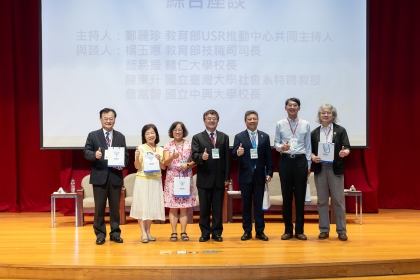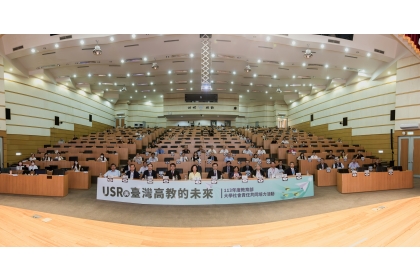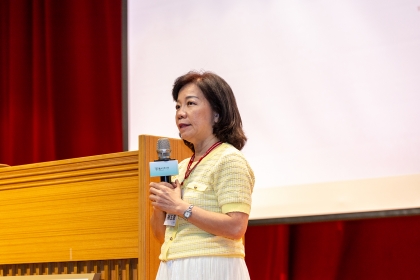111 Universities Across Taiwan Convene to Discuss USR and the Sustainable Development of Higher Education
2024-08-19
興新聞張貼者
Unit秘書室
1,562
What opportunities can promoting University Social Responsibility (USR) bring to the future of Taiwan's higher education? On August 13, the Ministry of Education's USR Promotion Center (Center for University Social Responsibility of MOE) and National Chung Hsing University (NCHU) co-hosted the fifth "2024 Ministry of Education University Social Responsibility (USR) Empowerment Activity" at the NCHU Library. The event, themed "USR and the Future of Taiwan's Higher Education," was held both in-person and online, with over 400 faculty members from 111 universities nationwide participating to discuss the sustainable development of higher education in Taiwan.
Since 2018, the Ministry of Education has promoted the University Social Responsibility Practice Program, through which many universities have showcased significant efforts in local revitalization, industry linkage, and environmental and cultural sustainability. By combining the strengths of faculty, students, and communities, these universities have led regional development. This year, the USR Promotion Center organized five empowerment activities, with the NCHU event being the final one, focusing on domestic and international trends to explore the future direction of Taiwan's higher education. It also discussed how USR can create opportunities for university sustainability and transformation, outlining the vision for the fourth phase of the USR program.
The opening ceremony was co-hosted by Yang Yu-Hui, Director-General of the Department of Technological and Vocational Education at the Ministry of Education, Professor Su Yuh-Long, Chief Convener of the Center for University Social Responsibility of MOE, and NCHU President Jan Fuh-Jyh. The morning session featured two keynote speeches and a panel discussion. Fu Jen Catholic University President Lan Yi-Chen delivered a speech on "The Linkage Between Taiwan's Higher Education and the United Nations' Sustainable Development Goals," while Professor Chen Dung-Sheng from the Department of Sociology at National Taiwan University spoke on "Social Practice and the Future of Taiwan's Higher Education." The panel discussion explored two topics: "How USR Creates Opportunities for University Sustainability and Transformation" and "How Schools Should Plan for the Fourth Phase of the USR Program with Sustainability as the Goal."
The afternoon session included two roundtable forums, moderated by Professor Su Yuh-Long, Chief Convener of the Ministry of Education's USR Promotion Center. Fourteen university presidents and vice presidents from sustainable-oriented universities shared their management strategies and sustainable practices, discussing feasible strategies and practices for USR in Taiwan's higher education and the unique development of universities.
In her speech, Director-General Yang Yu-Hui stated that since the launch of the USR program, many universities have worked diligently both domestically and internationally, earning significant recognition from external stakeholders, including partner organizations, stakeholders, and the general public. The Ministry of Education's fourth phase of the USR program is scheduled to close for submissions at the end of August. Yang hopes that through this forum, universities will continue to share experiences and discuss issues, refining the program further and moving closer to its core objectives, while gathering more resources to ensure the program's long-term success.
Professor Su Yuh-long emphasized that USR is a key driver for leading Taiwan's higher education towards sustainable development. Internationally, countries like the European Union, the United Kingdom, and Japan have made sustainable development a key goal of higher education. When universities integrate USR into their governance, it can foster multi-faceted collaboration with local communities, bringing more resources and benefits to the universities. USR encourages faculty and students to engage actively in social participation, making academic development and talent cultivation more attuned to local needs, and turning universities into think tanks and cradles for solving practical problems.
In his remarks, NCHU President Jan Fuh-Jyh expressed his gratitude to the Ministry of Education and the USR Promotion Center for collaborating with NCHU. He appreciated the presence of university presidents and faculty members from across the nation, who shared practical experiences and engaged in discussions on university management strategies and sustainable practices, creating a valuable platform for exchange. He also hopes that through this forum, universities will spark new ideas and move towards the goal of mutual benefit and shared success.
Since 2018, the Ministry of Education has promoted the University Social Responsibility Practice Program, through which many universities have showcased significant efforts in local revitalization, industry linkage, and environmental and cultural sustainability. By combining the strengths of faculty, students, and communities, these universities have led regional development. This year, the USR Promotion Center organized five empowerment activities, with the NCHU event being the final one, focusing on domestic and international trends to explore the future direction of Taiwan's higher education. It also discussed how USR can create opportunities for university sustainability and transformation, outlining the vision for the fourth phase of the USR program.
The opening ceremony was co-hosted by Yang Yu-Hui, Director-General of the Department of Technological and Vocational Education at the Ministry of Education, Professor Su Yuh-Long, Chief Convener of the Center for University Social Responsibility of MOE, and NCHU President Jan Fuh-Jyh. The morning session featured two keynote speeches and a panel discussion. Fu Jen Catholic University President Lan Yi-Chen delivered a speech on "The Linkage Between Taiwan's Higher Education and the United Nations' Sustainable Development Goals," while Professor Chen Dung-Sheng from the Department of Sociology at National Taiwan University spoke on "Social Practice and the Future of Taiwan's Higher Education." The panel discussion explored two topics: "How USR Creates Opportunities for University Sustainability and Transformation" and "How Schools Should Plan for the Fourth Phase of the USR Program with Sustainability as the Goal."
The afternoon session included two roundtable forums, moderated by Professor Su Yuh-Long, Chief Convener of the Ministry of Education's USR Promotion Center. Fourteen university presidents and vice presidents from sustainable-oriented universities shared their management strategies and sustainable practices, discussing feasible strategies and practices for USR in Taiwan's higher education and the unique development of universities.
In her speech, Director-General Yang Yu-Hui stated that since the launch of the USR program, many universities have worked diligently both domestically and internationally, earning significant recognition from external stakeholders, including partner organizations, stakeholders, and the general public. The Ministry of Education's fourth phase of the USR program is scheduled to close for submissions at the end of August. Yang hopes that through this forum, universities will continue to share experiences and discuss issues, refining the program further and moving closer to its core objectives, while gathering more resources to ensure the program's long-term success.
Professor Su Yuh-long emphasized that USR is a key driver for leading Taiwan's higher education towards sustainable development. Internationally, countries like the European Union, the United Kingdom, and Japan have made sustainable development a key goal of higher education. When universities integrate USR into their governance, it can foster multi-faceted collaboration with local communities, bringing more resources and benefits to the universities. USR encourages faculty and students to engage actively in social participation, making academic development and talent cultivation more attuned to local needs, and turning universities into think tanks and cradles for solving practical problems.
In his remarks, NCHU President Jan Fuh-Jyh expressed his gratitude to the Ministry of Education and the USR Promotion Center for collaborating with NCHU. He appreciated the presence of university presidents and faculty members from across the nation, who shared practical experiences and engaged in discussions on university management strategies and sustainable practices, creating a valuable platform for exchange. He also hopes that through this forum, universities will spark new ideas and move towards the goal of mutual benefit and shared success.




